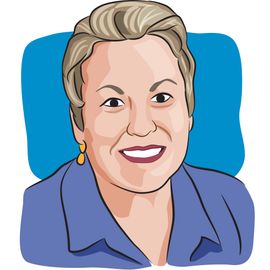- About Us
- Advertise / Support
- Editorial Board
- Contact Us
- CancerNetwork.com
- TargetedOnc.com
- OncLive.com
- OncNursingNews.com
- Terms & Conditions
- Privacy
- Do Not Sell My Information
- Washington My Health My Data
© 2025 MJH Life Sciences™ and CURE - Oncology & Cancer News for Patients & Caregivers. All rights reserved.
The Financial Advocate

Kathy LaTour is a breast cancer survivor, author of The Breast Cancer Companion and co-founder of CURE magazine. While cancer did not take her life, she has given it willingly to educate, empower and enlighten the newly diagnosed and those who care for them.
CancerCare's Diane Blum wants to make sure patients don't go broke.
Diane Blum, LCSW, executive director of CancerCare (www.cancercare.org), repeats the organization’s approach like a mantra. “Our focus is helping people with cancer one at a time. And using some of that knowledge to help paint the bigger picture.”
Blum, who celebrates 20 years with CancerCare in December, has played a significant role in helping the cancer community accept that the patient must be involved in all aspects of care by advocating nationally in a number of roles, one of which is serving on an American Society of Clinical Oncology task force studying the cost of cancer care for the past two years.
“There has been recognition that participation and communication are important. I see that in my work with ASCO. What started as lip service has become a real thing,” says Blum, who serves as the patient representative on the committee. The task force is researching cost issues, physician education, and patient support. Their report is expected later this year. Until then, a booklet that helps patients and doctors communicate about the costs associated with cancer care is available at www.cancer.net/managingcostofcare.
Blum says 50 percent of the callers to CancerCare have financial issues, a statistic that prompted her to expand the organization to begin offering co-pay assistance, a primary financial drain for patients. Drug co-payment is the amount or percentage of the price that isn’t covered by insurance, which can be up to 20 percent, and for drugs used off-label, meaning for an unapproved but medically appropriate indication, the co-pay can jump to 30 percent.
“We have committed $10 million in co-pay since last July,” Blum says.
Founded in 1944, CancerCare provides free professional support services to anyone affected by cancer. Based in New York City, CancerCare helps patients, caregivers, children, and loved ones to overcome barriers to quality cancer care through individual counseling from social workers and the organization’s free services, including telephone workshops, counseling programs, publications, and financial assistance programs.
Learn more about the CancerCare Co-Payment Assistance Foundation at www.cancercarecopay.org or call 866-552-6729.
Related Content:



